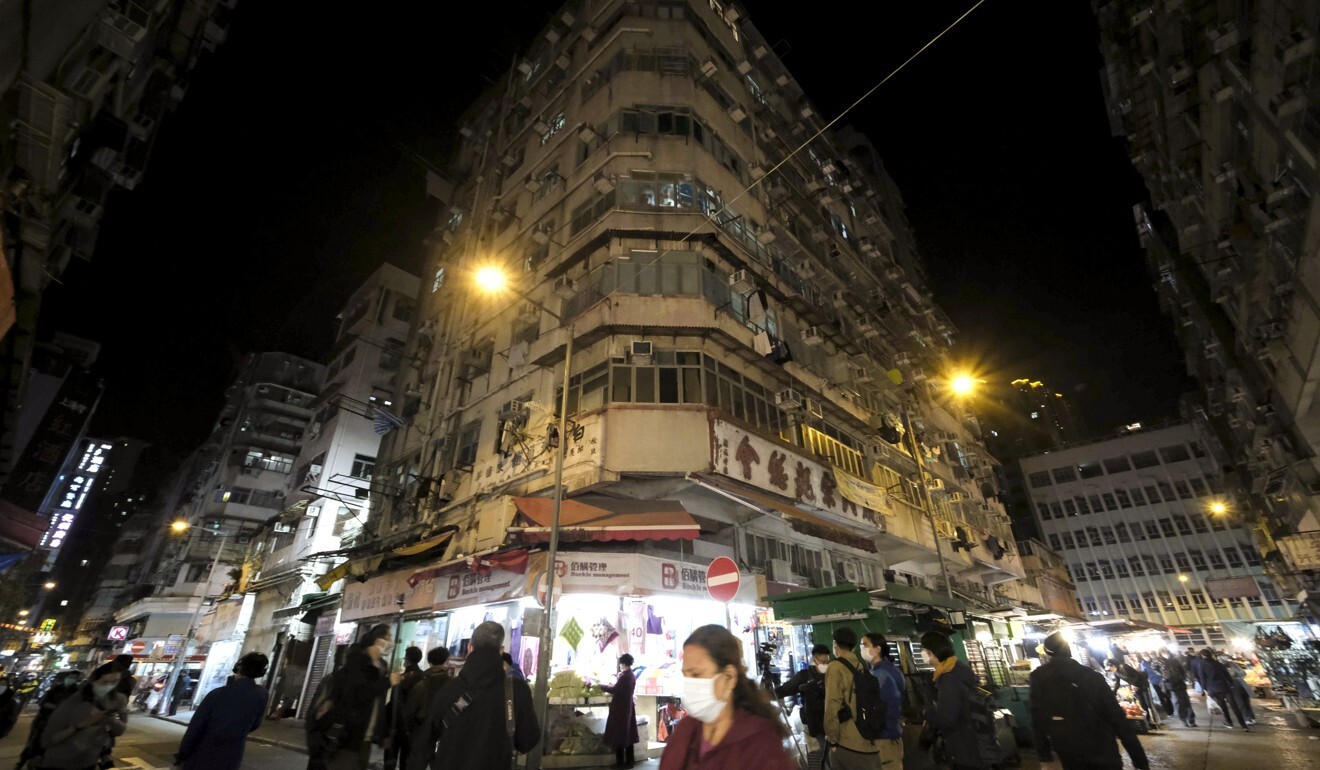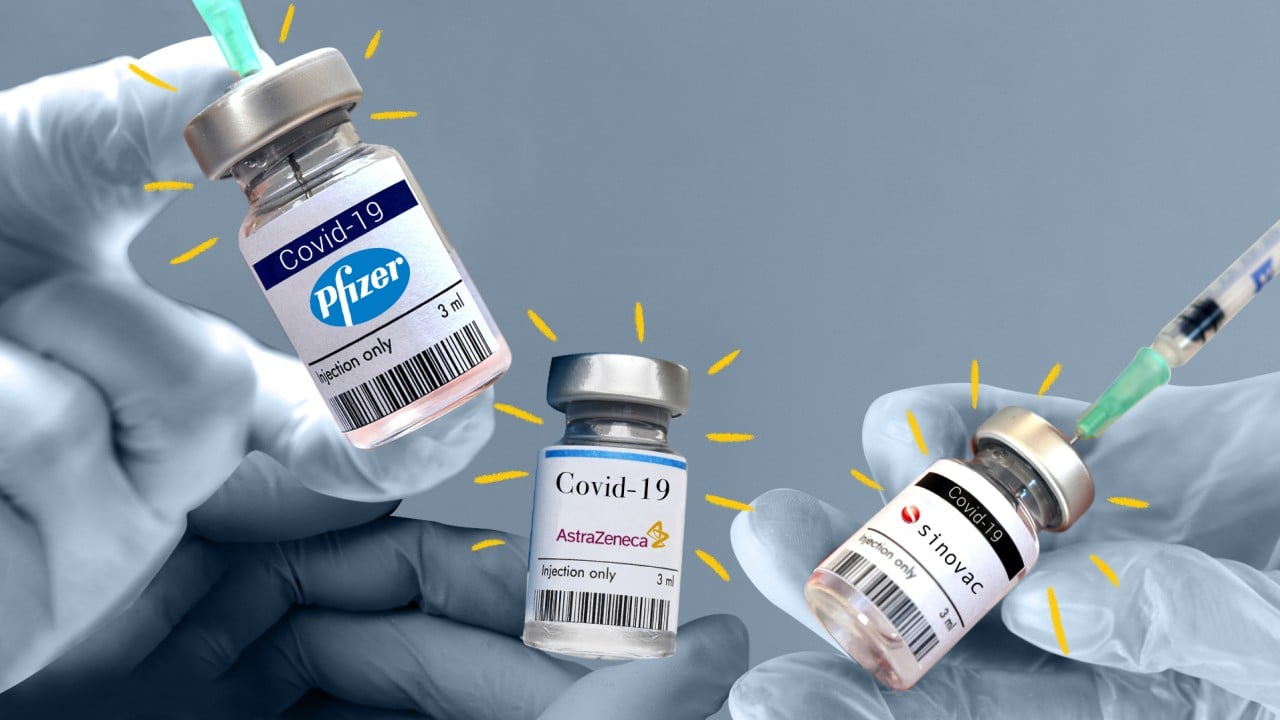
Hong Kong fourth wave: coronavirus tests ordered for residents of 4 linked tenement blocks, as 60 new cases confirmed
- Seven more residents confirmed infected in the interconnected buildings along Reclamation Street in Jordan, taking the total to 21
- Rebound in daily cases prompts the city’s leader to warn that Lunar New Year celebrations will have to be muted
Seven more residents were confirmed infected in the interconnected buildings along Reclamation Street in Jordan, taking the total there to 21, with some of the cases linked to other recent outbreaks in the city.
Health officials confirmed 60 infections across Hong Kong on Tuesday, all locally transmitted and including 13 that could not be traced. Nearly 30 others tested preliminary-positive.
The city now has a tally of 9,343 confirmed infections and 160 related fatalities, including an 81-year-old man who died on Tuesday.

The Centre for Health Protection appealed to the public to stop going out and to avoid social contacts, while reminding those who had visited coronavirus-stricken venues within specified time periods that they would have to be tested by law.
Dr Chuang Shuk-kwan, head of the centre’s communicable disease branch, warned of the risk stemming from the growing cluster in at least 11 flats at 20, 22, 24 and 26 Reclamation Street.
“The buildings there are old and have subdivided flats … while some pipes and facilities may be shared. These may pose a higher risk of transmission,” Chuang said.
Experts urge tougher crowd controls as 41 new Covid-19 cases emerge in Hong Kong
Tenants and visitors who had stayed in the affected buildings for more than two hours between December 30 and Tuesday would have to undergo compulsory testing, while residents on floors with infected patients would be sent to quarantine, she said.

04:12
Hong Kong researchers develop sewage monitoring system to detect coronavirus that causes Covid-19
Three more residents of two flats at 26 Reclamation Street, the hardest-hit block, were confirmed infected, taking the total to 14 patients in eight homes.
Chuang said contact tracing had indicated that cases from two flats had connections with other clusters such as construction sites at the Tseung Kwan O-Lam Tin Tunnel and the third airport runway project.
Four more residents in two other flats tested preliminary-positive for the coronavirus.
Five people in two flats at 20 Reclamation Street – where patients in one home were linked to a cluster at the Central Kowloon Route construction site – have been infected so far. Two residents in a flat at 22 Reclamation Street were also confirmed infected.
Chuang said the block at 26 Reclamation Street had previously been ordered to undergo mandatory testing, which helped uncover some infections.

Addressing concerns of potential communication problems for a large number of ethnic minority residents there, Chuang said the government had sent representatives to knock on doors in affected buildings and distribute leaflets on testing and quarantine measures in both English and Chinese.
Professor David Hui Shu-cheong, a respiratory medicine expert at Chinese University and a government adviser on the coronavirus, said the outbreak could partly be explained by high-risk factors there.
“It comes as no surprise that an outbreak will happen at subdivided flats, especially with so many people in proximity.”

But Chuang believed the risks were not localised.
“There are many possibilities for contamination living in a city with a high population density,” she said. “For example, residents exercising in public parks, going to shopping malls or even greeting each other in the lift, can all lead to the spread of the virus.”
Nine people who were close contacts of previously confirmed patients linked to the Central Kowloon Route road project were among the new cases, taking the cluster to 18.
Chuang also said residents at three blocks of Ping Shek Estate – Kam Shek, Lam Shek and Wong Shek houses – had been ordered to undergo a second round of mandatory testing after sewage samples from pipes continued to test positive for the coronavirus.
Meanwhile, the Post has learned Professor Gabriel Leung, dean of the University of Hong Kong’s faculty of medicine and another government adviser on the pandemic, and two staff members were tested for the virus following the infection of a reporter from online news site HK01 who recently interviewed him.
Leung and one staff member tested negative, while the other worker was awaiting results. They would not be sent to quarantine as they had worn masks during the interview, a source said.
Lam said she would ask the relevant ministers to make allowances for certain businesses or schools to reopen with necessary precautions in the future, but stressed “now is not yet the time”.

The daily Covid-19 caseload has been hovering between 20 and 60 since the start of the year, an improvement from the height of the city’s fourth wave of infections, when triple-digit figures were being recorded. But health experts warned the progress could be undone if residents continued to pack popular gathering spots, and suggested the government look at limiting crowd sizes at shopping centres and wet markets.
Infectious disease expert Dr Joseph Tsang Kay-yan called for the cancellation of all major Lunar New Year events and traditions, such as the rush to place the year’s first incense stick at temples and the annual worship at Sha Tin’s Che Kung Temple.

09:50
SCMP Explains: What's the difference between the major Covid-19 vaccines?
“This year, we have to be especially careful, as our local situation is still not under control. In the past, these events have always been packed with people, and any transmission that occurs here will be very difficult to contact trace,” Tsang said.
He agreed that limiting crowd numbers was a potential workaround option, adding it should be deployed at locations such as wet markets on a daily basis.
“The authorities must make a decision,” Tsang said.
Additional reporting by Natalie Wong


